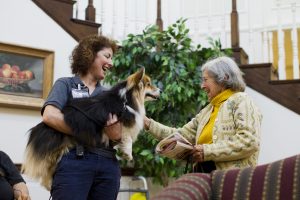
7 Things You Didn’t Know about TIHAI, and Director Dr. Lisa Freeman
Enhancing the lives of humans and animals—by studying their mutually beneficial relationships—is the mission behind Tufts Institute for Human-Animal Interaction (TIHAI). At the helm of the Institute is Dr. Lisa Freeman, whose passion for the cause runs deep. Head of the clinical nutrition team and a faculty member at Cummings School of Veterinary Medicine, she has had a connection with animals since childhood that plays a large role in her everyday life.
Below, Dr. Freeman discusses some lesser-known facts about TIHAI and the dynamic part she plays within it:
- Tufts Institute for Human-Animal Interaction (TIHAI) was launched in 2015 but developed out of a long-standing Cummings School-based animal visitation program.
“In 2009, I became the faculty advisor for Tufts Paws for People, a volunteer, animal-assisted therapy program which has existed in some form since 1998. At the same time, the program was growing, with more teams getting registered and visiting hospitals, eldercare facilities, schools, and a variety of other facilities.
“As we talked to faculty, staff, and students across the university, we were identifying a lot of enthusiasm for research, education, and service in human-animal interactions (HAI). We had interest not just in animal-assisted therapy, but also in benefits of pet ownership and the strong bond that exists between humans and other animals,” says Dr. Freeman. “Because of this growing interest and because Tufts also has unique expertise in this field, we decided to form a more organized institute to address research, education, and service aspects of human-animal interaction.”
- TIHAI is made up of animal enthusiasts across all of Tufts’ schools, not just the veterinary school.
“What sets TIHAI apart from others doing work in HAI is that we abandon traditional academic silos and look at HAI from a trans-disciplinary approach. TIHAI brings together Tufts faculty, staff, students, and alumni from many different disciplines—veterinary medicine, occupational therapy, engineering, nutrition, and psychology, among others—to advance research, education, and service that strengthen the bonds between humans and other animals.”
- Two key areas of focus for TIHAI are the need for more rigorous scientific evidence to understand and optimize human-animal interactions, and the need to be sure it’s done safely and effectively.
“The whole field of animal-assisted therapy has been growing. You see news stories all the time about the cat that visits a nursing home or a dog that goes to the library, and everybody loves these stories. It’s very easy when we visit people to see the benefits,” says Dr. Freeman. “But we have a lot of research questions to figure out: Are there differences depending on the type of animal that visits? How often do you need to visit? How long do the visits need to be? We need a lot of information on how to do this most effectively, and just as importantly, to be sure that it’s done safely—both for the people and the animals involved.”
- Freeman is the Director of TIHAI, but credits many interested parties across the university for coming together to create the Institute.
“This was very much a group effort from the beginning. We have an amazing board of advisors made up of veterinarians, engineers, psychologists, a physician, and an occupational therapist. And our TIHAI Ambassadors are even more multidisciplinary, coming from areas such as nutrition, mathematics, dental medicine, fine arts, and economics.”
- While there’s more research to be done, the TIHAI team has already made progress.
“We’ve been focusing on several areas, including animal assisted therapy, positive youth development, physical activity, and animal-assisted education. Animal-assisted education research includes the role of animals in engaging children in science, technology, engineering, and math (STEM) learning and canine-assisted reading programs. We’ve completed two studies on the benefits of dogs in helping children learn to read. It can increase not only reading skills but also children’s attitudes toward reading,” says Dr. Freeman.
- In addition to her enthusiasm for the growth of TIHAI, one of Dr. Freeman’s favorite HAI-related activities is visiting facilities with her dog, Penny.
 “I started out in this field by visiting with my Jack Russell terrier, Hazel, who loved participating in reading programs. Now, I visit with my corgi, Penny. We visit elder care facilities, go to college stress relief events, and also visit the local high school – we’re there to help reduce stress in the students during finals, but I think the staff get just as much out of our visits as the students!
“I started out in this field by visiting with my Jack Russell terrier, Hazel, who loved participating in reading programs. Now, I visit with my corgi, Penny. We visit elder care facilities, go to college stress relief events, and also visit the local high school – we’re there to help reduce stress in the students during finals, but I think the staff get just as much out of our visits as the students!
“One of my favorite things is to see the difference an animal can make. Recently, we were visiting a man with advanced Alzheimer’s Disease who looked very sad when we arrived. But, when I put his hand on Penny he started petting her, and his face broke into a smile. That was really great to see.”
- Freeman wears many hats.
 “There really is no such thing as a typical day for me since I juggle a number of different roles. As a veterinary nutritionist, I teach students, care for patients, and conduct research on nutrition and heart disease. For my role as Director of TIHAI, I get to work with faculty, staff, and students from across the university on programs, courses, research, and animal visitation events. I’m also Director of the Tufts Clinical and Translational Science Institute’s One Health Program. And, I’m on committees at Cummings School and Tufts University, as well as a variety of other national and international committees related to nutrition, One Health, and HAI,” says Dr. Freeman.
“There really is no such thing as a typical day for me since I juggle a number of different roles. As a veterinary nutritionist, I teach students, care for patients, and conduct research on nutrition and heart disease. For my role as Director of TIHAI, I get to work with faculty, staff, and students from across the university on programs, courses, research, and animal visitation events. I’m also Director of the Tufts Clinical and Translational Science Institute’s One Health Program. And, I’m on committees at Cummings School and Tufts University, as well as a variety of other national and international committees related to nutrition, One Health, and HAI,” says Dr. Freeman.